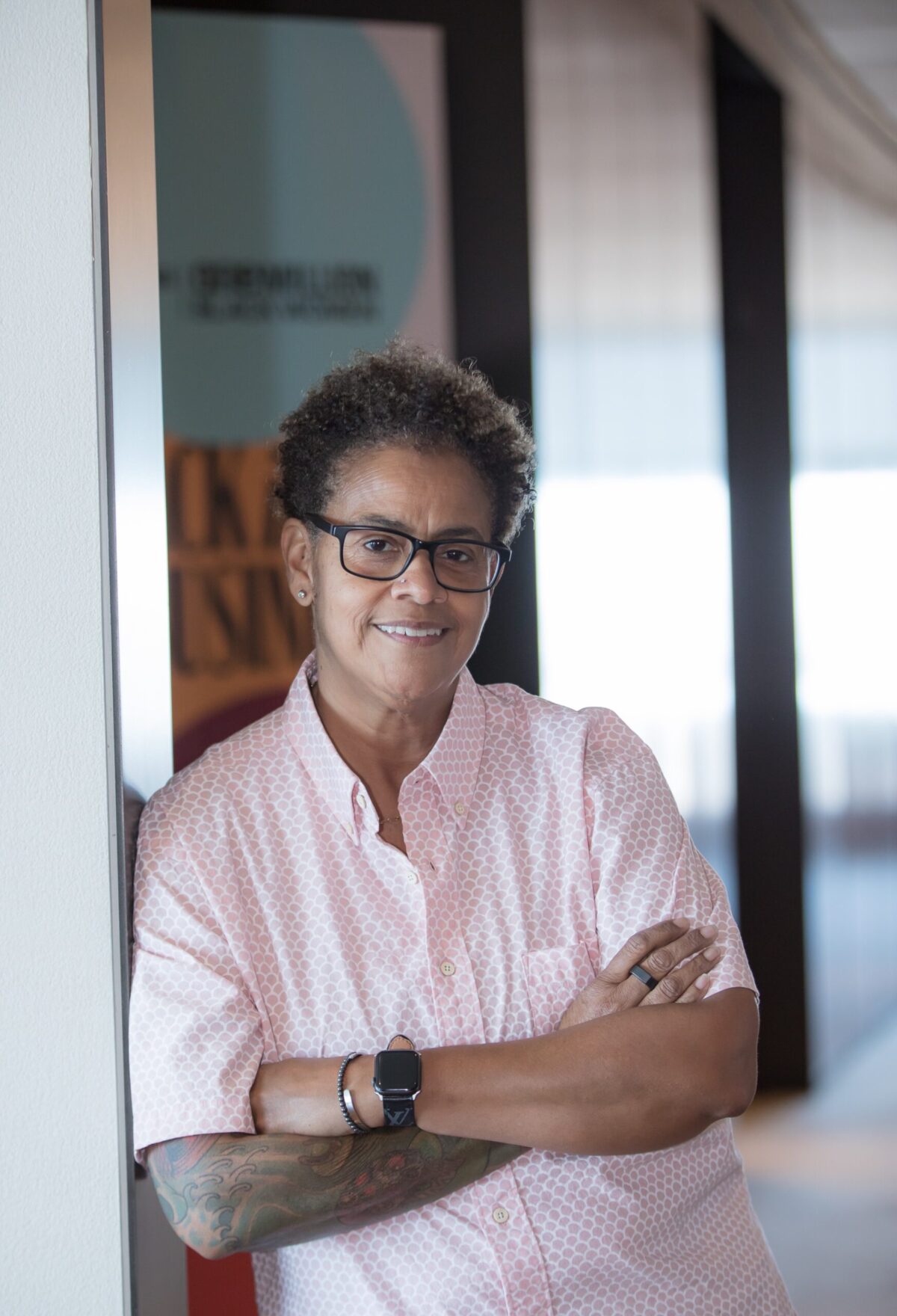For venture capital (VC) investors, the economic uncertainty of this sort-of-post-pandemic world has proven tricky. Add in things like a national anti-DEI backlash (complete with lawsuits) and a substantial drop in 2023 funding despite the launch of open-source generative AI, and you might call it fraught.
To better navigate this uncertainty, we connected with VCs based in Baltimore, DC and Milwaukee to see what trends they’re seeing for 2024. How cautious are they, and what kinds of companies are they interested in investing in?
Here’s what they told us:
‘Everybody is concerned about where the economy is going to go’
Chris College is a managing partner with TCP Venture Capital, the firm that manages the Propel Baltimore Fund. This early-stage VC fund focuses on investing in companies from anywhere in the country that will headquarter in Baltimore City.

Christopher College. (Courtesy)
The outlook for 2024, according to the 2020 RealLIST Connector, is economically uncertain as investors continue to anticipate a possible recession.
“We’re kind of in a transition stage right now, in terms of venture capital. Everybody is concerned about where the economy is going to go,” College said. “Half of the people think it’s going to be a soft landing, and things are going to work out well. The other half thinks that we’re going to actually have a recession.”
That uncertainty makes raising venture capital a challenge.
“We’re trying to find good companies to invest in and partner with and help grow, but it doesn’t look like it’s going to be the most attractive market for growing companies for the next year or two,” College said. “I think a lot of 2024’s outlook will be very dependent upon how the economy turns in the next month or two.”
Another challenge for startups in 2024: College said he’s seeing much fewer angel investors compared to a decade ago. Without that competition from angel groups and individuals with high net worth, valuations have dropped as less capital remains available.
What I’ve heard is anywhere from a third to a quarter of all of the early-stage technology companies that raised money in the last two years won’t be here by the middle of this year.Christopher College TCP Venture Capital
Startups that raised money last year could find themselves running out of money this year because capital stopped flowing about nine months ago.
“What I’ve heard is anywhere from a third to a quarter of all of the early-stage technology companies that raised money in the last two years won’t be here by the middle of this year,” College said.
So, in a time with fewer VC investments, what kind of startups are getting funded?
“The biggest trend we’re seeing in 2024 is how AI is really going to change almost all aspects of our business and personal lives,” College said. “I equate it to how the internet changed the way we do business. … So you’re seeing a lot of money being put into AI, and I think that will continue.”
‘There is an increased level of engagement’
Melissa Bradley is a DC-based founder and managing partner at 1863 Ventures, an accelerator for new majority entrepreneurs — an aggregation of diverse groups that have been historically marginalized — and general partner of 1863’s Venture Fund I and DC’s Inclusive Innovation Equity Impact Fund. Bradley is also a professor of practice at Georgetown University’s McDonough School of Business.
1863 Ventures will launch a new fund in 2024 and plans a high level of fundraising. But, with several lawsuits against organizations like Fearless Fund and Hello Alice that specifically fund Black entrepreneurs, Bradley is watching and waiting to see the outcomes.

Melissa Bradley. (Courtesy)
“I think [the lawsuits have] impacted the entire space VC, particularly for those who are people of color and/or invest in people of color, because there’s a national sentiment that is anti-affirmative action,” Bradley said. “What’s interesting is those lawsuits, which are very much about grant programs, have nothing to do with venture capital. But the haziness has flown in so giving grants to Black and brown people and investing are now used interchangeably.”
Those concerns have led to heightened diligence in investing and longer timetables to close.
“I think that there is an increased level of engagement to manage their risk tolerance, where before, it was, ‘I’m writing a check, we’ll follow up,’” she said. “And let’s be honest, there’s pros and cons, I think mostly pro. But there are some challenges in terms of trying to get to a close and have capital accessible to the entrepreneurs as they need it.”
Another issue in 2024, Bradley said, is the “21-month run of expecting a recession that hasn’t happened.” Capital is still being held back, and corporations are reducing their expenses. With a large number of Black and brown entrepreneurs running business services companies, that has an impact.
“We see a lot of business services, we see a lot of [consumer packaged goods, or] CPG, education, health care. I think those are on the rise,” Bradley said. “I think we certainly are beginning to see a lot more tech platforms and more SaaS products. I think we expect this year to see more AI-related businesses — probably not AI-first, but AI-adjacent or AI-enabled — but we’re sector agnostic. There’s no one sector we’re seeing.”
“I think what we are seeing, though, are companies who are coming to fundraise — and good for them — with more traction, revenue, more foresight around their own vision and a clear path that they want to go,” she added. “I think they’re coming with very solid and strong opinions around how to manage their cap table.”
The haziness has flown in, so ‘giving grants to Black and brown people’ and ‘investing’ are now used interchangeablyMelissa Bradley 1863 Ventures
Despite some challenges, Bradley said she has a lot to be excited about this year. One thing is the possibility of more funds of funds (FOF) — pooled funds that invest in other funds — that could make more diverse funds accessible to Black and brown investors and entrepreneurs.
“Knowing that the fastest-growing segment of entrepreneurs are women and people of color, we are beginning to see more funds of newer vintages that are coming up understanding that should be an explicit investment thesis. So that’s something I’m really excited about,” Bradley said. “I’m excited about the emerging young talent that is coming into the space thanks to many of the long-standing programs, often the fellows and many of the newer programs like Black Women in VC or Black Venture Institute.”
“As somebody who’s been doing this for over 20 years, I do believe that the presence of more people who have different thoughts allows the field to evolve,” she said.
‘Focus on what you can control’
Craig Schedler is the managing director and head of Northwestern Mutual Future Ventures, the venture capital fund backed by Northwestern Mutual, in Milwaukee.
“Our fund exists for two purposes,” Schedler said. “One, financial return, so we’re investing and acting like a traditional VC fund. But then we’re also looking to leverage our portfolio companies and our investments within our business so we can bring new innovative approaches to solving problems that that consumers have with their financial lives.”

Craig Schedler. (Courtesy)
Currently, Northwestern Mutual Futures Ventures is investing out of its second fund, a $150 million vehicle that launched in late 2019. The fund invests in fintech, digital health and data analytics.
If 2020 and 2021 were boom years for startups and 2023 was the aftermath, Schedler sees 2024 as the new normal.
“I think this is probably what venture looks like going forward for the foreseeable future,” Schedler said. “What does that mean? I think really, it’s companies that are achieving good metrics, being able to raise capital, which is kind of what the markets have always been.”
“I think there’s been this stabilization and realization around what metrics you need to raise at various stages,” he added. “There was some uncertainty in ‘22, and even into most of 2023, where investors were a little unsure what the appropriate metrics are to raise a Series B. And I think, as the public markets have rebounded a little bit last year, there’s more clarity on what private markets ultimately follow the public markets.”
Part of the new normal Schedler anticipates includes the reality that startups will see a fair number of down rounds — when a valuation goes down and a startup raises less than the previous funding round.
“Companies that raised in 2021 are going to have to come back to market and face the realities that even if they’ve grown, if they’ve executed well relative to plan, that valuations just aren’t where they used to be,” Schedler said. “People just aren’t paying the same multiples of revenue, they’re just not paying those same multiples today that they were in 2021.”
He sees three major areas doing well in 2024: AI, cybersecurity and fintech.
People just aren’t paying the same multiples of revenue … that they were in 2021.Craig Schedler Northwestern Mutual Future Ventures
“Fintech B2B payments, how businesses pay other businesses in a host of different settings, I think that’s going to be another area that’s going to continue to see a lot of interest,” Schedler said. “A shocking amount of payments between businesses are still made either by check in the mail or by wire transfers, both of which are very old-fashioned. There’s a huge need for modernization of B2B payments.”
While there may be challenges anticipated in raising funds, Schedler is optimistic, too, as long as you don’t expect pandemic-level funding in 2024.
“I think a lot of founders have two views on the market right now,” he said. “They think it’s impossible to raise and they’re not going to be able to at all, and I would say that’s not accurate. But some founders still think it’s 2021. Once in a while, you run into somebody who will say, ‘A company I know, or a peer of mine, raised this price, so I should be able to get that same,’ and it’s like, you’re raised in a very different market. So I think if I had one takeaway for founders, it would be to continue to focus on what you can control.”
Before you go...
Please consider supporting Technical.ly to keep our independent journalism strong. Unlike most business-focused media outlets, we don’t have a paywall. Instead, we count on your personal and organizational support.
3 ways to support our work:- Contribute to the Journalism Fund. Charitable giving ensures our information remains free and accessible for residents to discover workforce programs and entrepreneurship pathways. This includes philanthropic grants and individual tax-deductible donations from readers like you.
- Use our Preferred Partners. Our directory of vetted providers offers high-quality recommendations for services our readers need, and each referral supports our journalism.
- Use our services. If you need entrepreneurs and tech leaders to buy your services, are seeking technologists to hire or want more professionals to know about your ecosystem, Technical.ly has the biggest and most engaged audience in the mid-Atlantic. We help companies tell their stories and answer big questions to meet and serve our community.
Join our growing Slack community
Join 5,000 tech professionals and entrepreneurs in our community Slack today!

The person charged in the UnitedHealthcare CEO shooting had a ton of tech connections

From rejection to innovation: How I built a tool to beat AI hiring algorithms at their own game

Where are the country’s most vibrant tech and startup communities?




